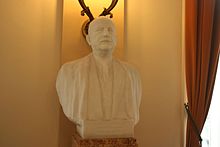Joseph Pholien
Joseph Clovis Louis Marie Emmanuel Pholien (born December 28, 1884 in Liège , † January 4, 1968 in Brussels ) was a Belgian Christian politician and Prime Minister .
Studies and professional activities
After studying philosophy at the University of Saint-Louis , law at the Free University of Brussels and earning a doctorate in law, he did an internship with the future Prime Minister Léon Delacroix . He then worked as a lawyer in Elsene himself .
Political career
Senator and Minister of Justice
His political career began in 1926 when he was elected to the Parti Social Chrétien (PSC), a predecessor of today's Center Démocrate Humaniste (CDH) , until 1929 as a member of the local council of Elsene. From 1936 to 1961 he was a member of the Senate .
From May 15, 1938 to February 20, 1939 he was Minister of Justice in the first cabinet of Paul-Henri Spaak . After the invasion of the Wehrmacht , he and several other senators wrote a public protest letter, whereupon he was arrested three times by the German occupying forces.
In 1946 he was elected Vice President of the Senate and was also a member of the Committees for Justice, Public Works, Colonies, Foreign Affairs and Public Health in the following years. In this function, he was, among other things, rapporteur for medical law.
Prime Minister 1950 to 1952
Pholien was Prime Minister from August 16, 1950 to January 15, 1952. During this time, after the “King's Question”, King Leopold III officially abdicated . and the coronation of Baudouin I. On the other hand, his term of office was marked by problems of the world economy and the resolution of the "teaching dispute". It was about the question of free (denominational) teaching or state-regulated teaching in the language regions. Ultimately, however, internal party strife led to his resignation.
From January 15 to September 2, 1952, he was still Minister of Justice in the cabinet of his successor Jean Van Houtte . After the pardon of two collaborators originally sentenced to death and storms of indignation among the population, he resigned from his ministerial office. During his tenure as Prime Minister, the Ministry of Justice decided that the death sentences imposed on collaborators after the end of the war would not be carried out because of Belgium's humanitarian tradition.
In January 1966 he was given the honorary title of "Minister of State".
Web links
- Biography of the Center permanente pour la citoyennete et la Participation (CPCP)
- Biography on the Prime Minister's homepage
- Cabinet Ministerial List 1950-1952
- Government declaration of August 17, 1950
- “Quick Trip,” Time magazine article on April 17, 1951
- Joseph Pholien et le Jeune Barreau de Bruxelles. In: F. Carton de Tournai & G. Janssens (eds.), Joseph Pholien. Un homme d'état pour une Belgique en crises, Bierges, éditions Mols, 2003, 81-88
| personal data | |
|---|---|
| SURNAME | Pholien, Joseph |
| ALTERNATIVE NAMES | Pholien, Joseph CLME |
| BRIEF DESCRIPTION | Belgian politician and prime minister |
| DATE OF BIRTH | December 28, 1884 |
| PLACE OF BIRTH | Liege |
| DATE OF DEATH | 4th January 1968 |
| Place of death | Brussels |

